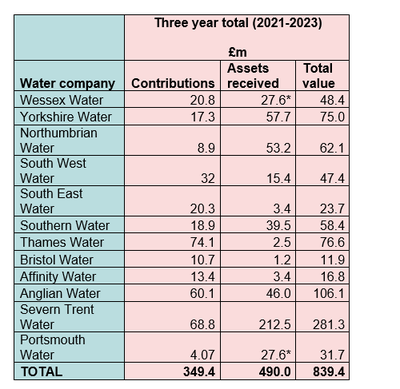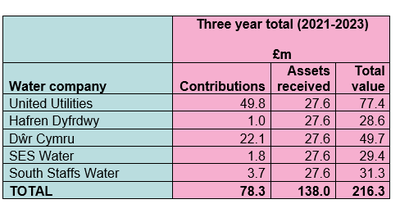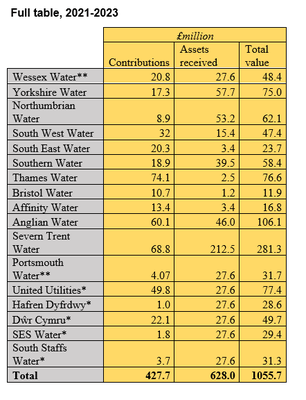150,000 homes remain on hold due to nutrients ban despite investment and minimal contribution to the issue
New research revealed today shows that house builders have given water companies over £1bn in the past three years alone, to ensure infrastructure is in place to facilitate new homes – something they have palpably failed to deliver. The news comes as the Office for Environmental Protection announces that government and regulators have broken the law by not keeping sewage companies in check.
Despite this funding, and the fact that new homes make a negligible contribution to the issue, a moratorium remains in place in 74 local authority areas, holding back the delivery of around 150,000 desperately needed new homes. Housing supply is expected to plummet in the coming years, deepening the housing crisis that is creating acute social implications across the country.
The findings come the day before the Government’s legislative changes to EU-imposed rules are debated in the House of Lords that would lift the moratorium on development by quango, Natural England. The solution includes a requirement for industry to pay a further £140m to continue to mitigate the small amount of nutrients from new homes.
Whilst house building has been blocked by Natural England, Defra’s own figures suggest that 60-80% of phosphorus entering rivers comes from a failure of water companies to effectively treat wastewater [1].
Wastewater in the system comes from many sources including the hundreds of thousands of existing homes in each area, plus from transport and commercial operations. Industry has long argued that the additional contribution of a few thousand new homes each year is negligible in comparison to existing loads. More water efficient new homes could actually help reduce the amount of waste water occupants moving from older homes would generate.
Defra also acknowledges that ‘agriculture and wastewater are together the biggest sources of nutrient pollution in the water environment’ [2]. Government proposals include money to improve farming infrastructure such that run off from damaging fertilisers is reduced – a solution that will actually tackle the real issue.
Stewart Baseley, Executive Chairman of HBF said; “Despite the fact that new homes make a negligible contribution to the nutrients issue, around 150,000 homes across the country remain on hold. Whilst doing nothing to reduce the disgraceful pollution of our rivers the ban is deepening our housing crisis, reducing economic activity and costing jobs. After four years we need to see politicians delivering a solution to address this damaging ban so desperately needed homes can be built.”
The debate comes as new research by the Home Builders Federation shows that in the past three years, developers have given water companies more than one billion pounds in cash contributions and new assets to support upgrades to water provision and wastewater treatment.
The total value of contributions made by developers to water companies between 2020/21 and 2022/23 is estimated at £1.05bn, which includes:
- £427m in developer payments for Infrastructure Charges and connection fees; and
- More than £600m in new assets being added to water company balance sheets in the form of new pipes and other infrastructure from which water companies will ultimately also derive a long-term income stream from
Infrastructure charges paid by developers to water companies ‘are made for the additional demand that each new connection puts on the overall capacity of the water supply and sewerage systems. Eventually these systems will need to be enlarged… to treat more wastewater and the infrastructure charge is a contribution to this.’ (United Utilities) [3].
Water companies covering some of the areas most severely affected by the nutrient neutrality restrictions are among those to have received the highest payments from developers over recent years with Severn Trent receiving almost £70m in payments and Anglian Water topping £60m in contributions from builders.
Research conducted into the accounts of 12 water companies reveals the total value of confirmed developer payments to water providers between 2021 and 2023 amounted to £350m. It has been estimated that a further £78m will have been paid to the five water companies that did not report their revenue deriving from developers.
In addition, £435m worth of new assets were provided to 10 water companies by developers between 2021 and 2023. Extrapolating figures to include the seven others from whom figures were not available, it is estimated that £628m of new pipes and infrastructure were added to water company balance sheets during the period.
House building does not contribute to the pollution of waterways but Natural England believes that the occupancy of new homes, through the generation of wastewater, have the potential to contribute to discharges by water companies. It is expected that by 2030, water companies should have adequately upgraded their infrastructure.
Notes
12 of the 17 water companies provided all or part of the information required in their annual accounts:

Five water companies did not provide figures in relevant annual accounts. For these companies, we extrapolated figures from their total revenue. For the companies that did report their figures for developer payments, we found that the charges represented 0.98% of total revenue on a mean average basis and 0.91% of total revenue on a median basis.
The figures below therefore estimate developer payments based on a multiplier of 0.91% of total revenue over the period while assets are estimated as an average of the figures provided by the reporting companies.


*Estimated figures
**Assets estimated
[1] Consultation on environmental targets (Defra), May 2022 (page 19) https://consult.defra.gov.uk/natural-environment-policy/consultation-on-environmental-targets/supporting_documents/Environment%20Targets%20Public%20Consultation.pdf
[2] Ibid
[3] ‘What are infrastructure charges?’ https://www.unitedutilities.com/builders-developers/builders-and-developers-faqs/charges/what-are-infrastructure-charges/
ENDS
For media enquiries, or to arrange an interview, contact media@hbf.co.uk or Steve Turner on 07919 307760 or steve.turner@hbf.co.uk
Notes to Editors:
- The Home Builders Federation (HBF) is the principal representative body for private sector home builders and voice of the home building industry in England and Wales. HBF member firms account for some 80% of all new homes built in England and Wales in any one year, and include companies of all sizes, ranging from widely recognised national firms, through regionally based businesses and small local companies: hbf.co.uk
Update 20 September 2023: The 150k estimate was a calculated assessment of the nutrient neutrality issue based of available data. On 17 September Government released analysis which suggests 16,500 homes will be delayed on blocked each year. We have updated our figures accordingly and they are available on our nutrient neutrality campaign page.